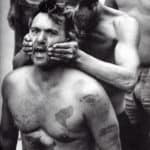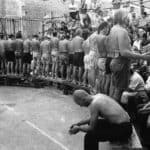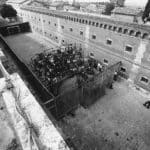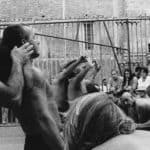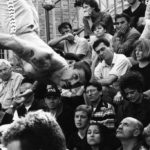I Negri (1996)
from Les Nègres by Jean Genet
directed by Armando Punzo
artistic collaboration by Nicola Rignanese
set and costumes by Valerio Di Pasquale, Carmen Lopez Luna con la collaborazione di Gianni Gronchi e Luisa Raimondi
music by Pasquale Catalano
with Adriano Amata, Alfonso Avella, Carlo Barresi, Nicola Bello, Barhane Bouzid, Juàn Caceres Gonzàles, Domenico Caia, Nicola Camarda, Francesco Capasso, Alberto Casaroli, Giovanni Chessa, Antonio Cinque, Ignazio Cocco, Ludovico Di Leva, Valerio Di Pasquale, Domenico Di Sarlo, Michele Ferraro, Carmelo Ferrugia, Mirko Gianduia, Giuseppe Giannuso, Giorgio Granatelli, Antonio Grisi, Antonio Linguanti, Salvatore Longo, Raffaele Prete, Leonardo Priolo, Giuseppe Raineri, Luigi Riccio, Rocco Romano, Graziano Salis, Roberto Sanna
production of Carte Bianche, Centro Teatro e Carcere di Volterra.
Premiere Volterra, Prison, July 24, 1996 – VolterraTeatro Festival, Theater of San Pietro, 25-26 July 1997
Compagnia della Fortezza’s I Negri (‘The Blacks’)
by Letizia Bernazza
In Compagnia della Fortezza’s I Negri, as was the case for their Marat-Sade and for La Prigione, the company’s own circumstances are reflected in the original text. Instead of focusing on the text’s antithesis between Blacks and Whites which Genet develops beyond the problem of racism as a problem between the I and the Other, Armando Punzo concentrates on the opposition between prisoners and free individuals; he thus transforms the prostration of the Blacks, who cause the murder of a white woman in front of a court of whites, into the humiliation of the detained who effectively display themselves to an audience of free spectators.
The director has spoken of “asking himself how Genet might have felt: what his humiliation was, what had led him to write this text and at the same time to distance himself, through the act of writing, from the biographical events which moved him to write. I see it as a meeting point between despair and a ferocious self-irony” (Punzo, 1996). The questions Genet’s text elicits (what does it mean to be Black? What colour are the Blacks? How do you feel as a Black?) are used to reflect on the defenceless, marginal condition experienced by those who live in detention centres, as well as on the obstacles encountered by the Compagnia della Fortezza and on how those obstacles were overcome. “Since our very first readings”, Punzo continues, “we dedicated I Negri to all those people who have betrayed us somehow. We feel like we should thank them because they reminded us of who we really are, of what our place and our role is. Without these people’s superficiality we would have never been able to perform this work” (Punzo, 1996).
Documents are published in original language. In case the translation is present, both the original and the translation are published.
Compagnia della Fortezza, TESTO “I Negri” da Jean Genet (Einaudi Editore 1982) in
Valentina Valentini, I nostri spettacoli sono diversi perché sono veri e sentiti - conversazione con i detenuti-attori in Letizia Bernazza e Valentina Valentini, (edited by, La Compagnia della Fortezza, Rubbettino editore, Saveria Mannelli (CZ) 1998
Maria Grazia Gregori, «I miei carcerati? Come i negri nel lager di Genet», interview with Armando Punzo, «l'Unità», July 18, 1996
Armando Punzo, Una compagnia di negri recita per un pubblico di bianchi,
I Negri
La Compagnia della Fortezza - directed by Ferruccio Marotti
Volterra - 26 July 1997
Orlando Furioso-Work on the show created in 1998 with the actors of the Compagnia della Fortezza
edited by Andrea Salvadori and Valerio Di Pasquale
Aggeo Savioli, Clownerie nere dietro le sbarre, «l'Unità», 26 July 1996
Ettore Vittorini, Carcerati-attori, rabbia "da negri", «Corriere della Sera», 26 July 1996
Domenico Rigotti, Quell'atto unico che evasione, «Avvenire», 27 July 1996
Gianfranco Capitta, In un mondo da reinventare, «il Manifesto», 27 July 1996
Masolino d'Amico, Sul treno dello scontro razziale e tra i neri acrobati di Genet, «La Stampa», 28 July 1996
Renato Palazzi, Volterra, luogo del delitto, «Il Sole 24 Ore», 28 July 1996
Magda Poli, A Volterra l' urlo dei " negri " e delle donne algerine, «Corriere della Sera», 29 July 1996
Rita Cirio, Le nostre prigioni, «l'Espresso», 29 August 1996



